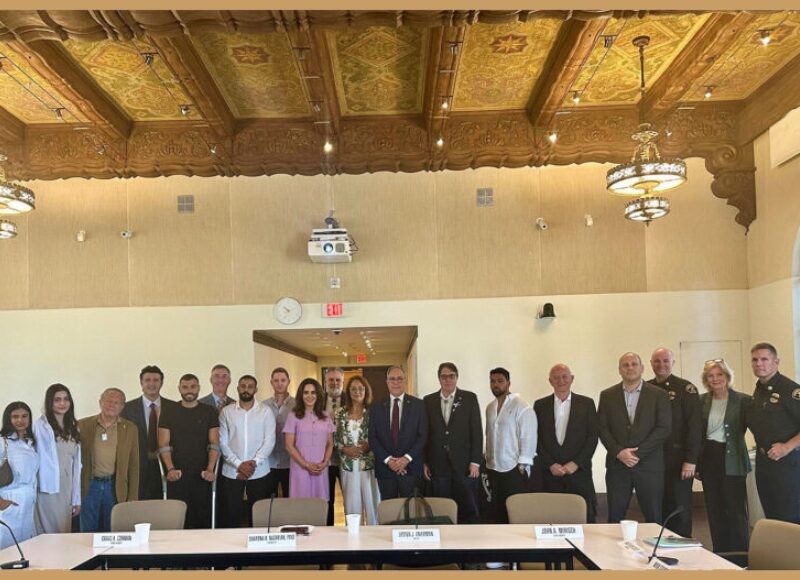A delegation of Israel Defense Forces and Israel Police veterans traveled to Beverly Hills on June 25 to share their stories of how Beit Halochem, an Israeli organization that heals wounded veterans, helped them recover after being nearly killed in the course of battle.
The delegation included remarks from Micha Koubi, a former IDF Special Forces officer who has interrogated the mastermind of Hamas’ Oct. 7 attack and explained how Hamas spreads its violent ideology and is supported by its Middle Eastern allies.
Coming days after pro-Palestinian protestors demonstrated in front of a Pico-Robertson synagogue, the visit was the latest example of how Beverly Hills has reaffirmed its bond with Israel as a bulwark against rising antisemitism in the United States, Mayor Lester Friedman said.
“We do have a united city, that always will support the right of Israel to exist,” Friedman said.
Vice Mayor Sharona Nazarian, a former national vice president of Beit Halochem, said that organizers initially wanted to host the delegation at her home, but she felt it was important to include her fellow councilmembers, Beverly Hills Police and Fire Department officers, state representatives and wider public in the conversation.
“We’re gathered to bear witness, and we want to see the testimonies of survivors from the Oct. 7 massacre in Israel,” Nazarian said. “We must ensure that our community not only hears these stories, but also stands united in support and solidarity against hate.”
The soldiers and police officer who visited Beverly Hills all recounted stories of heroism and narrow escapes from death, though many of their friends were not as lucky. They also described how, through their rehabilitation at Beit Halochem facilities, they not only survived, but are beginning to thrive, reuniting with their families, regaining their independence, and in the case of Orr Sheizaf, relearning how to run.
Orr Sheizaf, a 35-year-old reservist, was called up after Oct. 7, and wounded during a raid in Khan Younis, when a booby trap detonated an explosion. When the smoke cleared, he looked down and “saw holes” in his foot.
Sheizaf escaped to relative safety, and when a soldier came over to treat him, Sheizaf, an avid marathon runner, said, “Take care of my feet. I can handle life without one arm, but I have to go back to running.”
Since February, Sheizaf has been rehabilitating at a Beit Halochem facility, where he is regaining his strength as a runner. Though Sheizaf still has a long way before his next marathon, he is “very happy” to have been approved for light training.
He attributed his recovery to “the facilities and guidance and professionals who support me, and also my community of people who understand me. There is something about seeing other wounded veterans around you that … encourages you to carry on.”
For Shalev Best, a squad commander in the Israel Police Special Forces, his story began on Oct. 6, when he was working security at the Nova Music Festival. After rockets began firing towards Israel, Best received reports of terrorists heading for the kibbutz hosting the festival, and he ordered the partygoers to disperse.
Best and his fellow police officers faced off against eight terrorists. He was shot four times and saved by a bullet that had hit his gun. Though civilians from the kibbutz tried to mend his wounds, Best felt he couldn’t breathe, and he called his wife—with whom he has two kids—to say goodbye.
Eventually, the civilians who saved him put him in a military vehicle, and Best was driven to a hospital, where he underwent four surgeries, and is now going through the rehabilitation process with Beit Halochem.
On the morning of Oct. 7, Eden Ram, who was born in New Jersey but grew up in Jerusalem, was in charge of 13 soldiers. An hour after being woken by sirens at 6:30 a.m., Ram and her fellow soldiers ran to the shelter in their base’s command room, chased by terrorists who shot her in her leg and killed another soldier.
After Ram reached the safe room, the terrorists continued their killing spree, taunting Ram by sending photos of the soldier they had just killed, she said. Ram and her soldiers exchanged gunfire with the terrorists, who killed more of her friends, and Ram texted her family goodbye, saying she was going to die.
Four hours later, after suffering through “a world of pain, two angels, fighters,” rescued Ram and the other surviving soldiers, she said.
In all, Ram was shot 12 times. She still has a bullet lodged in her hip, though with the help of Beit Halochem, she has made a miraculous recovery.
“Thanks to Beit Halochem, I went through an amazing recovery, from being in a wheelchair to back to my life,” Ram said. “Beit Halochem is like my second home.







